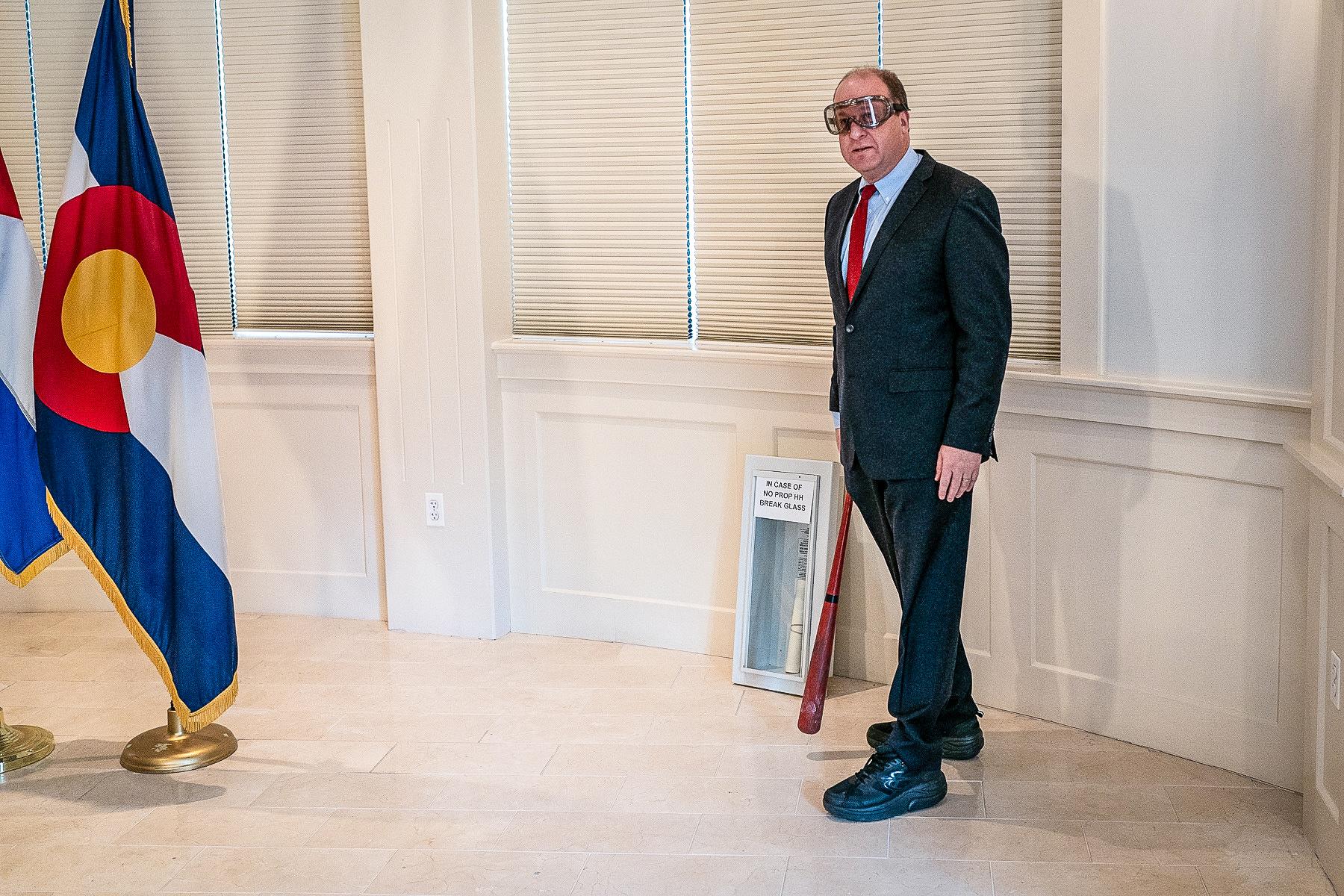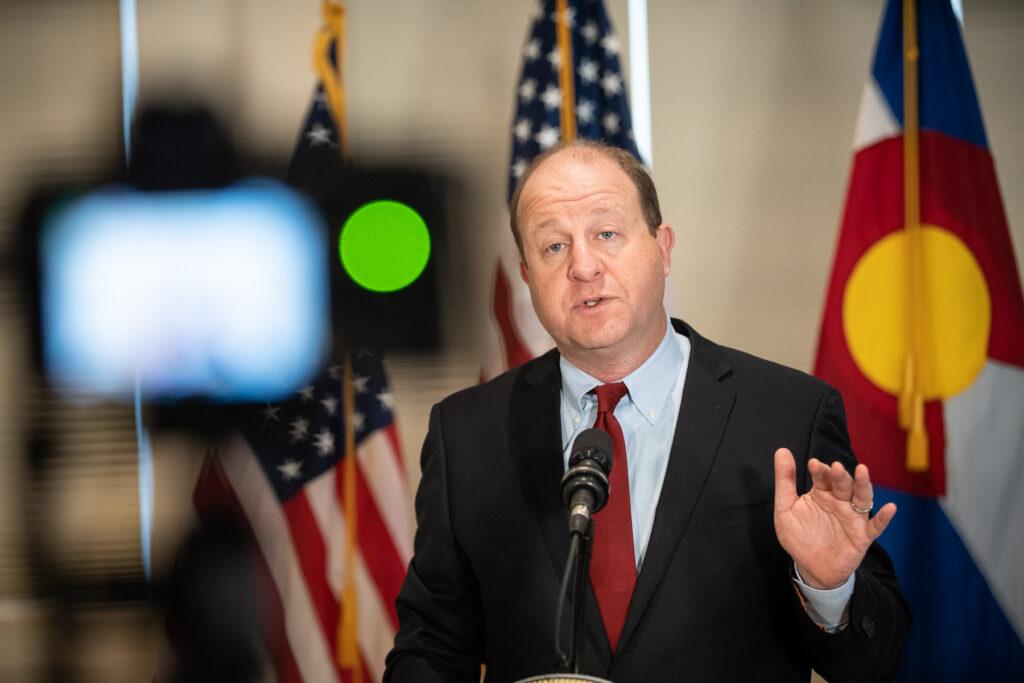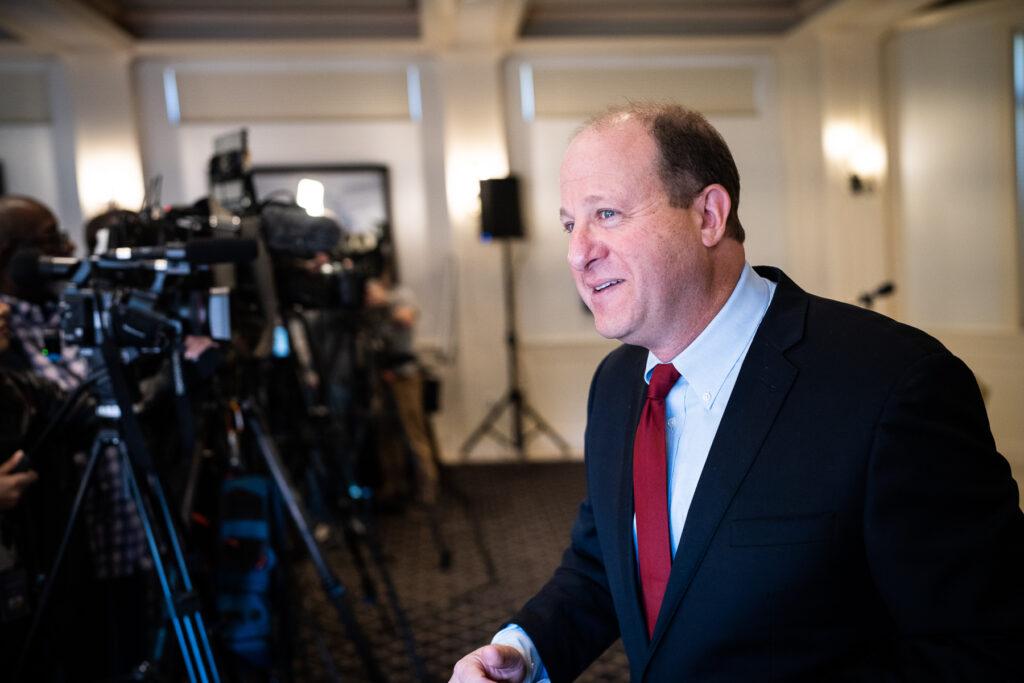
Updated 1:12 p.m. on Thursday, Nov. 9
Colorado lawmakers are headed back to the state Capitol to deal with property taxes.
“We need to act for short-term property tax relief now,” said Gov. Jared Polis at a press conference announcing a special session Thursday. “Any relief for the current tax year to homeowners has to be done now.”
Polis said the session will focus on a quick fix for the 2023 tax year, while also impaneling a commission to look at longer-term changes. Lawmakers will convene on Friday, Nov. 17, and work for a minimum of three days — the shortest amount of time it takes to pass a bill into law in Colorado.
Polis announced the special session with a couple props and a bit of dramatic flair.
Just two days earlier, voters had soundly rejected Proposition HH, a sprawling Democratic tax reform package that would have offered some relief for property owners. With that option eliminated, Polis walked into a room full of reporters, strapped on safety goggles and picked up a well-worn Rawlings baseball bat. Then he landed a couple loud blows on a glass-fronted case — quite literally breaking glass in case of emergency — and pulled out a document.
“Looks like a special session,” he said as he unfurled the executive order calling lawmakers back to the Capitol next week.
The stunt didn’t get any laughs from the assembled press, but it certainly got everyone’s attention. Polis said the session will focus on a quick fix for the 2023 tax year, for which taxes are due next year. He also wants to form a “blue ribbon” commission to look at longer-term changes.
“If we do nothing, Colorado homeowners are facing record property tax increases,” Polis said. “The cost of inaction is too high. It means people could be forced to make the hard choices between their property taxes and groceries or gas. For Colorado renters, it means the uncertainty of how much their rent will go up, as landlords pass their costs on to them.”

With property values rising around 40 percent statewide, homeowners have been bracing for a big jump in their bills next year. And lawmakers don’t have much time to act; counties are finalizing their budgets now, and only have until Dec. 15 to set their tax rates.
Democrats had originally proposed Prop. HH as their answer, but it went down in flames amid widespread confusion, skepticism and outright opposition from local governments and conservatives. Polis blamed its defeat on the fact that it was too complex and too broad, saying its numerous policies should have been broken into multiple measures.
“Prop. HH proposed a long-term fix. Part of what we want to call the special session (for) is to propose and put together a blue ribbon panel to figure out a long-term fix … that includes caps like Prop. HH had, includes property tax cuts, whatever other elements to do that,” Polis said. “Realistically, that’s not going to happen in a week or two.”
Even before election results came in, Polis was apparently laying the groundwork for a Plan B. House Minority Leader Mike Lynch said the governor called him on the afternoon of Election Day to talk about other routes to tackle property taxes.
“We started talking instantly about what that policy would look like moving forward,” Lynch told CPR on Wednesday, adding that he appreciated the outreach. But Republicans also pointed out that they have been calling for a special session for months, adding the legislature could have simply passed a law to drop rates in the first place instead of running Prop. HH with its broader proposed changes.
In his special session announcement, Polis called for lawmakers to “bridge partisan divides” in addressing the issue. And he said the strategies on the table — reducing the valuation of properties for tax purposes and lowering the statewide assessment rate — would be similar to those envisioned by Prop. HH.
“We would certainly be open to others, but those two [approaches] are the ones that I think the legislature will likely be looking at,” he said.
Republicans generally agree with that approach — earlier this fall they proposed a measure that almost exactly mirrored the rate changes in Prop. HH — although they strongly objected to other components in the ballot question.
Some Democrats, though, want to take a different approach to tax relief, finding a way to focus more of the benefits on lower-income households.
Polis has pointed out that the design of the discount formula in Prop. HH would have delivered a greater proportional benefit to less expensive properties. In other words, a cheaper home would see a greater percentage reduction in its tax bill, compared to a more expensive one. But the most expensive homes would still get a much greater discount in terms of actual dollars under that approach.
One big question facing lawmakers is how they would pay for their cuts. Any reduction in property tax rates means less money going to schools and local governments, at least compared to the status quo. That could be especially impactful for rural districts that have seen little growth and don’t have a financial buffer to offset tax rate cuts.
Polis noted that the legislature had already set aside $200 million to offset property tax cuts envisioned by Prop. HH, but he said he hoped lawmakers would find even more money for the effort.

The legislature also could spend some of the state’s multi-billion dollar TABOR surplus to pay for the cuts, rather than refunding that money through TABOR checks or other measures. Or lawmakers could dip into the state’s spending reserve. Colorado currently has historically high financial reserves, and Polis said he was willing to spend some of that rainy day fund.
Groups representing Colorado’s cities and counties have opposed a statewide approach to addressing property taxes, arguing that it’s an issue best left up to local governments.
Property taxes won’t be the only thing lawmakers take on in the special session. Polis also is asking them to pass a bill allowing Colorado to access a new federal program that provides free meals to children during the summer.
Polis said getting the law passed earlier will give Colorado more time to stand up the new program, which could benefit more than 300,000 children in the state as soon as next summer.








